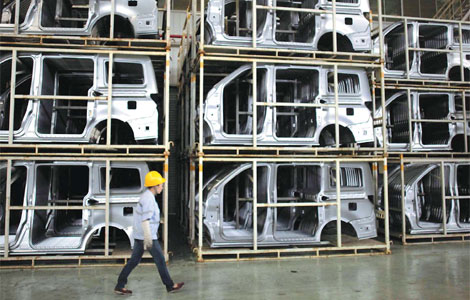Less carbon, less pollution
Updated: 2013-06-18 08:14
(China Daily)
|
|||||||||||
The spread of pollution following China's industry transfer from the developed eastern region to the less-developed central and western regions has become a new headache that cries for attention, particularly on a day meant to promote a low-carbon lifestyle.
The pollution movement has not been given enough attention, as the focus has been on the economic development of the underdeveloped regions. There have been several major cases in recent years in which enterprises have moved highly polluting plants inland in the name of developing the local economy.
China has been a victim of the international transfer of pollution, as polluting production has accompanied foreign investment in China in the past decades. It is part of the strategy by which international enterprises use the developing world as a "pollution haven" to accommodate their pollution-causing capacities. China must not allow its domestic enterprises to adopt the same approach.
The pollution transfer inland is especially harmful since the central and western regions are ecologically more vulnerable compared with the east coast. Once damage is done, it may take much more time to restore the health of the environment.
For policymakers in the less-developed central and western regions, it is a real dilemma to balance economic growth and environmental protection. In reality, however, economic growth has often had the upper hand, because it contributes to the career performance of officials even if the local environment is damaged.
The career assessment rule for officials, therefore, must be revamped so that environmental protection has a significant weighting.
People's right to know, meanwhile, must be respected so that local people can participate in the supervision of economic development projects that might have an impact on the local environment. Growing social discontent in some places in recent years shows that people's right to know is yet to be fully respected, a fact that could facilitate undesirable environment-related decision-making.
At the same time, as the nation embraced its first Low-Carbon Day on Monday, it should learn from the successful practices in global and domestic carbon trade to build a nationwide market-oriented environmental compensation system. Such a system will mean enterprises whose economic activities harm the environment have to pay to repair the damage they have caused.
Related Stories
China shows resolve, action against air pollution 2013-06-15 17:14
10 steps taken to curb air pollution 2013-06-15 07:47
Soil survey to examine extent of pollution 2013-06-14 08:12
Water pollution challenges green push 2013-06-09 06:00
Today's Top News
China rejects Snowden spying claims
Putin, Obama face off over Syria
China to hold talks with DPRK
3 charged over attack on Chinese
G8 kicks off amid controversy
Travel becomes a family affair
Weibo draws more than just locals
New tech can help to keep food safe
Hot Topics
Lunar probe , China growth forecasts, Emission rules get tougher, China seen through 'colored lens', International board,
Editor's Picks

|

|

|

|

|

|





